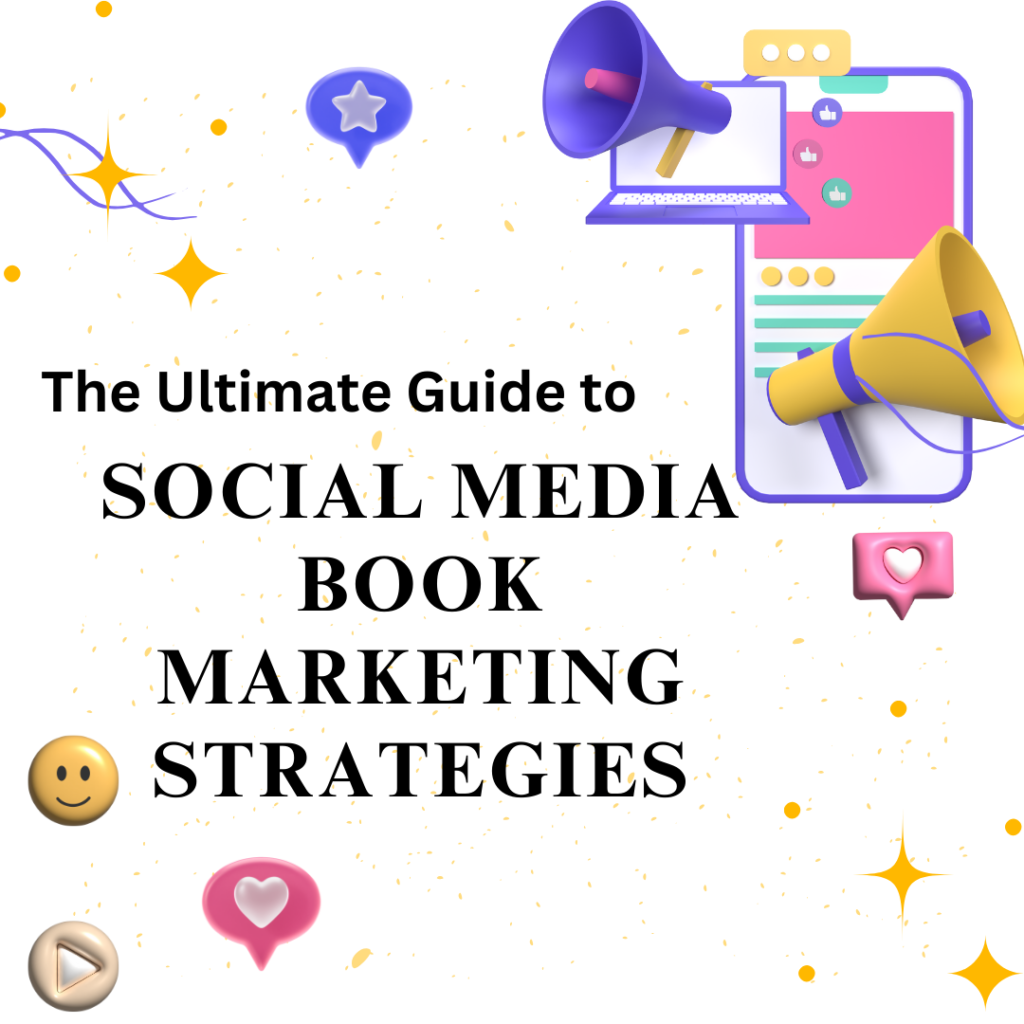Introduction
In the fast-paced world of publishing, authors face both unprecedented opportunities and challenges. One of the most powerful tools at their disposal is social media. With its vast reach and ability to target specific audiences, social media has transformed book marketing into a dynamic and interactive process. Whether you’re a debut author or a seasoned writer looking to boost your sales, mastering the art of social media book marketing is essential. In this comprehensive guide, we’ll explore effective strategies to harness the full potential of social media in promoting your book.
☆ Understanding Social Media Book Marketing

In today’s digital age, social media has revolutionized how authors promote their books and connect with readers. Understanding the intricacies of social media book marketing is crucial for authors aiming to maximize their book’s visibility, engage their audience, and ultimately drive sales. This guide delves into the fundamentals of social media book marketing, offering insights and strategies to help authors navigate this dynamic landscape effectively.
Social media platforms such as Facebook, Instagram, Twitter, and LinkedIn offer authors unprecedented opportunities to reach a global audience. Unlike traditional marketing channels, social media enables direct interaction with readers, fostering a sense of community and personal connection. Through compelling content and strategic engagement, authors can build their brand, cultivate a loyal following, and promote their books authentically. Social media book marketing plays a crucial role in leveraging these platforms to connect directly with readers and enhance author visibility in the digital age.
✨ 🚀 Why Use Social Media for Book Marketing?
Social media platforms offer unparalleled opportunities to engage directly with your target audience, build a community around your book, and generate buzz before and after its release. Here are some key benefits of using social media book marketing:
- Reach: Social media platforms have vast user bases, allowing you to reach a global audience instantly.
- Engagement: You can interact directly with readers through comments, messages, and live sessions, fostering a deeper connection.
- Visibility: Increased visibility leads to more opportunities for reviews, interviews, and media coverage.
- Analytics: Most platforms provide insights into audience demographics and engagement metrics, helping you refine your marketing strategies.
🔑 Key Platforms and Their Benefits

Each social media platform has its unique strengths and audience demographics, making it essential for authors to choose wisely based on their target readership. Social media book marketing strategies should be tailored to each platform’s strengths to effectively engage with readers and maximize outreach.
- Facebook: Ideal for creating author pages, joining book-related groups, and hosting virtual events like book launches and Q&A sessions.
- Instagram: Known for its visual appeal, Instagram allows authors to showcase book covers, share behind-the-scenes content, and engage with readers through visual storytelling.
- Twitter: A platform for real-time updates, Twitter facilitates conversations about books, trends, and author insights, making it perfect for engaging with a diverse audience and industry professionals.
- LinkedIn: Targeting professionals in the publishing industry and readers interested in non-fiction or business-related topics, LinkedIn helps authors establish authority through articles, posts, and professional networking.
📚 Effective Social Media Strategies for Authors 🎯

In the digital age, social media has become a pivotal tool for authors to connect directly with their audience, build their author brand, and promote their books effectively. Crafting and implementing a robust social media strategy can significantly enhance an author’s visibility, engagement levels, and ultimately, book sales. Here are some effective strategies for authors to leverage social media effectively: using targeted hashtags, engaging with book clubs, and running interactive give a ways can all boost social media book marketing efforts.
☆ Define Your Goals
Before diving into social media, it’s crucial for authors to define their goals clearly. Whether it’s increasing book sales, building a loyal fan base, establishing authority in a niche genre, or connecting with influencers, having well-defined goals will guide your content strategy and overall approach.
☆ Know Your Audience
Understanding your target audience is key to crafting content that resonates with them. Research their demographics, interests, and behaviors on social media platforms. This knowledge will help you tailor your content and engagement strategies to effectively reach and engage with your ideal readers.
☆ Choose the Right Platforms
Not all social media platforms are created equal, and it’s important to select the ones that align best with your audience and goals:
- Facebook: Great for building communities, hosting events, and sharing longer-form content.
- Instagram: Ideal for visual content such as book covers, quotes, and behind-the-scenes glimpses.
- Twitter: Perfect for real-time engagement, short updates, and connecting with influencers and industry professionals.
- LinkedIn: Useful for networking with professionals, sharing industry insights, and promoting non-fiction or business-related books.
☆ Create Compelling Content
Content is king on social media. To capture and maintain your audience’s attention, create diverse and engaging content that adds value:
- Visuals: Share high-quality images of your book covers, promotional graphics, and aesthetically pleasing photos related to your writing journey.
- Videos: Create book trailers, author Q&A sessions, live readings, or behind-the-scenes videos to give your audience a deeper insight into your work.
- Blog Posts and Articles: Share informative articles related to your genre, writing tips, or discussions on relevant topics to showcase your expertise and provide value to your audience.
☆ Engage Authentically
Social media is about building relationships. Engage authentically with your audience by responding to comments, thanking readers for their support, and actively participating in conversations about your books and related topics. Genuine engagement fosters loyalty and encourages readers to become advocates for your work.
☆ Utilize Hashtags and Trends
Research and use relevant hashtags to expand your reach and visibility on social media platforms. Monitor trending topics and hashtags within your genre or industry to join conversations and increase your content’s discoverability.
☆ Collaborate and Partner
Collaborate with influencers, other authors, or book-related communities to broaden your audience reach. Participate in cross-promotional activities, joint giveaways, or virtual events to leverage each other’s networks and gain exposure to new readers.
☆ Measure and Adjust
Regularly monitor your social media analytics to track the performance of your posts, engagement rates, follower growth, and other relevant metrics. Use these insights to refine your content strategy, optimize posting times, and adjust your approach based on what resonates most with your audience.
☆ Invest in Paid Advertising
Consider allocating a budget for targeted social media advertising campaigns to amplify your reach and promote specific books or events. Platforms like Facebook Ads and Instagram Ads offer robust targeting options to reach your ideal audience based on demographics, interests, and behaviors.
☆ Stay Consistent and Persistent
Consistency is key to building a strong presence on social media. Develop a content calendar and posting schedule to maintain regular communication with your audience. Persistence in implementing your social media strategies over time will yield cumulative benefits in terms of audience growth, engagement, and book sales.
📚🌐Conclusion 📖
Self-publishing is evolving with technological advances and changing reader preferences. Authors can leverage trends like increased audiobook production, personalized marketing strategies, and enhanced reader engagement through online platforms. By embracing these opportunities and innovations, authors can navigate the dynamic landscape of self-publishing to reach global audiences, retain creative control, and maximize their success in the digital era of publishing. Social media book marketing plays a crucial role in achieving these goals by connecting authors directly with their readers and promoting their work effectively across various platforms.

